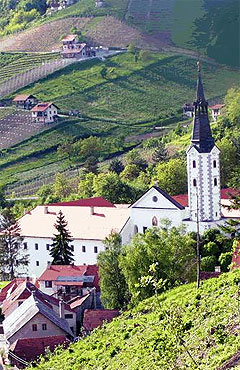Klanjec
 Klanjec is located in the western part of the Krapina-Zagorje County. To the north it borders the Tuhelj district, to the east Veliko Trgovišće and to the south Kraljevec na Sutli. The western border flows mostly along the river Sutla, which is also the state border with the Republic of Slovenia. The town was built on a hill under the 511 m Cesarska Gora mountain, under the ruins of the medieval castle Cesargrad. Once a famous local center and market for this part of Hrvatsko Zagorje, the town today, with its 600 inhabitants, keeps and offers visitors remnants of its rich history. Klanjec was first mentioned in 1463, in a document by king Mathias Corvinus, and the Cesargrad estate already in 1399. After the castle had become property of the Erdödy family, began the important connection of Klanjec and this aristocratic family. Nikola and Sigismund Erdödy built the Franciscan monastery with the Church of Annunciation between 1630 and 1689. In the church's crypts, in the valuable sarcophagi of exceptional artistic value, the remains of its founders are kept. The history of the town is rich with great names of the Croatian cultural and art heritage. A part of his life the poet Antun Mihanović spent in the nearby Novi Dvori castle. He is the author of the Croatian national anthem. This is also the birthplace and the grave of the painter of the Croatian Illyrian Movement, Oton Iveković, and Antun Augustinčić, the world-renowned sculptor, who donated his artworks to the town, was also born in Klanjec.
Klanjec is located in the western part of the Krapina-Zagorje County. To the north it borders the Tuhelj district, to the east Veliko Trgovišće and to the south Kraljevec na Sutli. The western border flows mostly along the river Sutla, which is also the state border with the Republic of Slovenia. The town was built on a hill under the 511 m Cesarska Gora mountain, under the ruins of the medieval castle Cesargrad. Once a famous local center and market for this part of Hrvatsko Zagorje, the town today, with its 600 inhabitants, keeps and offers visitors remnants of its rich history. Klanjec was first mentioned in 1463, in a document by king Mathias Corvinus, and the Cesargrad estate already in 1399. After the castle had become property of the Erdödy family, began the important connection of Klanjec and this aristocratic family. Nikola and Sigismund Erdödy built the Franciscan monastery with the Church of Annunciation between 1630 and 1689. In the church's crypts, in the valuable sarcophagi of exceptional artistic value, the remains of its founders are kept. The history of the town is rich with great names of the Croatian cultural and art heritage. A part of his life the poet Antun Mihanović spent in the nearby Novi Dvori castle. He is the author of the Croatian national anthem. This is also the birthplace and the grave of the painter of the Croatian Illyrian Movement, Oton Iveković, and Antun Augustinčić, the world-renowned sculptor, who donated his artworks to the town, was also born in Klanjec.
Address: Trg Mira 11, 49290 Klanjec
Tel: 049 550-615,550-250
Fax: 049/550-324
E-mail: grad-klanjec@kr.t-com.hr
web: http://www.klanjec.hr
Objects on town area
Wine Society "Antun Mihanović"
Franciscan Monastery and Church of the Annunciation of the Blessed Virgin Mary
Chapel of St. Florian
Antun Augustincic Gallery
Klanjec Tourist Board
Novi Dvori Castle
